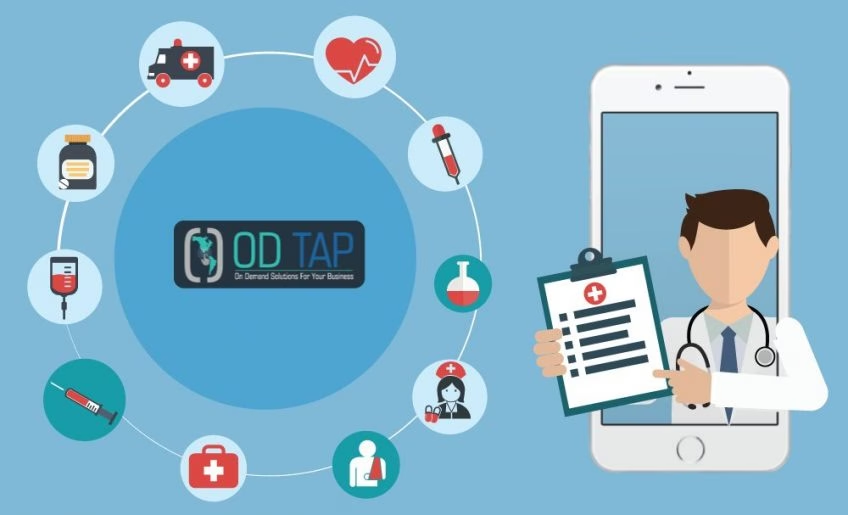
How to Build a Medical App for Doctors
Interested in knowing how to build a medical app for doctors?
Read our comprehensive guide to learn how to create and how to launch a health app. This article will answer the most popular questions about medical app development or healthcare mobile app development: How much does it cost to develop a healthcare mobile app? Are health apps profitable?
What is the medical app development process? How do I make a health tracker app? And how long does it take to create a medical app for doctors?
So let's get started!
In this article
- What is a Medical App?
- How to Build a Medical App for Doctors: 11 Steps
- Frequently Asked Questions on How to Build a Medical App
Healthcare apps represent an excellent market with many opportunities to be explored.
According to a study, the global market for medical apps is expected to be worth $11.22 billion by 2025, as you can read in a report by BIS Research.
Healthcare mobile application development requires a deep understanding of web and mobile app development frameworks, deployment guidelines for mobile app stores, healthcare frameworks, API integrations, application security, industry compliance regulations, etc.

Get a complimentary discovery call and a free ballpark estimate for your project
Trusted by 100x of startups and companies like
If you don’t have a professional team with this relevant expertise to take on the complex task, then submit a request for a complimentary discovery call, and one of our tech account managers who managed similar projects will contact you shortly.
What is a Medical App?
Mobile health, or mHealth for short, is a term that refers to the use of mobile devices in healthcare.
In a broad sense, a medical application is software developed for medical purposes. Medical apps can be professional and general.
Professional medical apps are intended for doctors. This is exactly the type of app we will be discussing in this article.
The professional medical app purposes can be as follows:
- telemedicine apps;
- doctor appointment apps;
- medical reference apps;
- health records apps, and more.
Innovating in the medical app industry gives your business a chance to expand rapidly and means lots of profit. Let's see how you can build an effective medical mobile app and make a mark in the growing healthcare app market.
How to Build a Medical App for Doctors: 11 Steps

How do you build a healthcare app for doctors? Such a project involves the following steps:
1. Review an existing app to understand the target market
Review an example of a medical app before you set out to launch one since this will give you a fair idea of what you should offer to the target audience.
A variety of mobile healthcare apps are available in the market, including health tracking apps, clinical assistance apps, fitness apps, etc. Epocrates is an excellent example, and it’s available on the web, Android, and iOS.
It offers the following features:
- Doctors can save time while prescribing.
- Epocrates offers help with many areas of prescribing, e.g., pharmacology, safety around prescribing, adult and pediatric dosages, adverse reactions, etc.
- Healthcare professionals can access a drug interaction checker feature, which helps to prevent harmful interactions.
- Epocrates has a pill identifier feature, moreover, it offers dosage calculators, medical equations, and similar tools.
- The app helps doctors with information on drug coverage for over 6,000 US insurance plans.
- The app offers a customizable home screen, and healthcare providers can use its drag-and-drop features.
- The premium version of the mobile health application has additional features like peer-reviewed medical content.
You can check out the Epocrates Android app for more information. Alternatively, you can review its iOS app.
2. Define the scope of the overall app
Start with onboarding a competent project manager (PM), an experienced IT architect, and a team of business analysts (BAs) with experience in the healthcare industry.
Decide on the features you will offer. I recommend the following:
- Build a web app, an Android app, and an iOS app.
- Offer features like Epocrates and English language support to users in the US to start with.
- Include interactive features like the option to access electronic medical records, schedule appointments with patients, track patients' health indicators, etc.
You will likely launch a “Minimum Viable Product” with minimal features to test the market, subsequently, you will enhance the app.
Consider using the Agile SDLC model for such projects, and learn more about Agile in “What is software development life cycle and what do you plan for?”.
3. Prioritize features for your MVP
Determine the features you will offer in your MVP app by taking the following steps:
- Understand your customers and what constitutes “business value” for them, by conducting intense “discovery sessions”.
- Analyze how your planned features address specific customer pain points, with the help of tools like the “Pain and gain map”.
- Based on the above, prioritize features for your MVP using tools like the “prioritization matrix”.
Read our guide “5 tips to create a sleek MVP” for more insights.
3. Formulate a development approach geared toward success
Meticulous planning is the key to the success of this project, therefore, formulate an appropriate development approach. The following are my recommendations:
Hire expert healthcare app developers for your next project
1,200 top developers
us since 2016
- Develop native iOS and Android mobile health apps since they offer the best user experience, performance, and security on mobile devices.
- Use a modern runtime environment like Node.js, which helps to develop scalable and performant web healthcare apps.
- You could launch your app in more geographies later, therefore, factor in app internationalization guidelines. Read about them in “The ultimate guide to mobile app internationalization”.
- A medical app will process “Protected Health Information” (PHI), therefore, plan to secure your app.
- Use managed cloud services platforms like “Platform-as-a-Service” (PaaS) and “Mobile-Backend-as-a-Service” (MBaaS), which will eliminate the task of IT infrastructure management for you.
- Implement core features by developing own APIs, and use market-leading 3rd party APIs to implement non-core features.
- Use a mobile device and browser lab on the cloud to enhance your test coverage.
You can learn about the value of this approach in “What is the best development approach to guarantee the success of your app?”.
4. Onboard and organize your development team
Onboard your development team and read our guide “How to find a good software developer” for help. You need to staff the following roles:
- UI designers;
- Web developers with Node.js skills;
- Mobile developers:
- Android developers with Java skills;
- iOS developers with Swift skills;
- Testers;
- DevOps engineers.
Your team must collaborate and work cohesively for the success of the project, therefore, use the “Scrum” technique to organize it. Use an effective PM tool like Jira, and do the following:
- Form “Scrum teams”, i.e., small, cross-functional teams where developers and testers work together. The PM needs to perform the “Scrum Master” role.
- Empower the team sufficiently so that it can estimate requirements and plan them in iterations called “Sprints” in the scrum parlance.
- Ensure that the PM prioritizes creating value for users over mechanical processes, e.g., the PM should hold effective “Daily stand-up meetings” for project tracking.
- Build a transparent environment where collaboration with customers is valued. E.g., the team needs to demonstrate a functional app in “Sprint review meetings” to obtain approval from the business stakeholders.
Our guide “How to build a Scrum development team?” can help you.
5. Strategize for securing your app
Businesses processing PHI (public health information) need to comply with stringent regulations like the “Health Insurance Portability and Accountability Act” (HIPAA) in the US. Information security is a key aspect of such regulations, therefore, strategize carefully about securing the personal health information of your app users.
Do the following:
- Incorporate multi-factor authentication (MFA) instead of relying solely on passwords.
- Use strong data encryption algorithms like AES-256.
- Utilize next-gen firewalls and antivirus solutions.
- Proactively mitigate top application security risks like injection, broken authentication, XML external entities (XXE), cross-site scripting (XSS), etc. You can read the “Open Web Application Security Project (OWASP) top 10 application security risks” report for guidance.
- Consider using cloud computing smartly, e.g., you can use a hybrid cloud deployment. Here, you will store sensitive health data on a private cloud, however, you can run other workloads on a public cloud.
- Secure your APIs using various techniques like digital signatures, encryption, authentication, quotas, throttling, secure gateways, etc.
- Utilize real-time threat intelligence solutions.
- Instead of treating security and compliance testing as the last activity, proactively include it in your CI/CD pipeline with the help of “compliance-as-code”. Read “Compliance as Code: The New Frontier in Compliance Automation” for more insights.
6. Sign-up for the right PaaS and MBaaS platforms
PaaS platforms can help you to expedite web app development since they offer the following advantages:
- PaaS platforms manage the cloud infrastructure, networking, operating system, middleware, and runtime environment, therefore, you can focus on development.
- As I have explained in “10 top PaaS providers”, PaaS platforms enable you to integrate APIs, add database resources, and use robust DevOps tools.
- Scaling a web app is easier when you use a PaaS platform.
Sign-up for AWS Elastic Beanstalk, which is the PaaS offering from AWS.
You can expedite healthcare mobile app development with an MBaaS platform. Such platforms offer many advantages, e.g.:
- They manage the cloud infrastructure and persistent storage, therefore, you don’t need to build and manage the mobile backend.
- MBaaS platforms enable you to integrate APIs, moreover, they help you to implement security features.
- Implementing features like user management and “push notifications” is easier with an MBaaS platform, furthermore, you can easily scale your mobile app.
Use AWS Amplify, i.e., the MBaaS offering from AWS.
7. Find market-leading 3rd party APIs to implement the non-core features
Displaying drug interaction and medical diagnostics information is important, however, it’s not a core feature. Similarly, you need the “push notifications” feature, however, it’s a non-core feature.
I recommend that you use the following market-leading 3rd party APIs:
- Use the Infermedica medical API for displaying diagnostics information in your app. The Infermedica AI inference engine can analyze patient data and provide a list of likely conditions and relevant observations. Read the Infermedica documentation to learn how to use this API.
- Sign-up with Wolters Kluwer and use its “All Drugs APIs” solution. This solution is broad and includes APIs like “Adverse Drug Effects”, “Drug Allergy”, “Drug Interactions”, etc. Consult the Wolters Kluwer “Resources” webpage to learn how to use these APIs.
- Use the Twilio “Programmable SMS” offering, which is a bulk-SMS API solution to help you to implement the “push notifications” feature. Read “Messaging Services and Copilot” to learn how to use this API solution.
8. Develop APIs for your core features
You ought to develop APIs for implementing the core features that doctors will use, and I recommend that you develop RESTful APIs. Take the following steps:
- Use Postman for API development and testing, moreover, use Swagger for documenting the APIs.
- Host the APIs using your AWS account, and use robust database solutions like PostgreSQL and MongoDB for API development.
- Manage the development, staging, and production environments effectively.
- Secure your APIs using the techniques that I suggested earlier.
- Design URL paths meaningfully, moreover, formulate effective rules for API requests and responses.
Our guide “How to build RESTful API for your mobile app?” can help you.
9. Find a mobile device and browser lab on the cloud
Test your medical mobile apps with a wide range of devices to ensure that they work with all relevant devices.
You need a mobile device and browser lab on the cloud for this, therefore, sign-up for the digital.ai mobile device & browser lab. It’s easy to use, thanks to its excellent documentation.
10. Develop the proposed web app/ Healthcare web app development
It’s time to get on with the web app development, therefore, take the following steps:
- Design a user-friendly UI by using best practices mentioned in “User interface design guidelines: 10 rules of thumb”.
- Code the app using node.js, the popular open-source runtime environment.
- Use IntelliJ IDEA, a popular IDE to code the app. You also need to read “Node.js and NPM” for guidance.
- Integrate the 3rd party APIs and the APIs you developed.
- Test the app, and deploy it using the AWS DevOps tools. Read “Deploying Node.js applications to AWS Elastic Beanstalk” for guidance.
11. Develop your planned Android and iOS healthcare apps
Medical or healthcare mobile app development: you need to take the following steps to develop your proposed Android app:
Hire expert healthcare app developers for your next project
- Design a UI that’s simple for your users, and follow the “Material Design” guidelines.
- Code the app in Java, and use Android Studio, the popular IDE.
- Integrate the APIs, and test the app using Espresso and the Experitest mobile device lab.
- Publish your app to Google Play using the instructions in “Publish your app”.
Developing the planned iOS app involves the following steps:
- Follow “Human Interface Guidelines” and design a user-friendly UI.
- Code the app using Swift, and use the Xcode IDE.
- Integrate your APIs and the 3rd party APIs.
- Use XCTest and the Experitest mobile device lab to test the app.
- Read “Submit your apps to the App Store”, and publish your app to Apple's App Store.
Preparing to Launch Your Medical App for Doctors?
I hope this blog gives you enough information on how to build a medical app successfully. However, building innovative and custom health app features will take more knowledge and an expert mobile healthcare app development skillset.
The market for mobile medical apps is highly competitive, and you need to develop a healthcare app with key differentiators. Such a project can be complex, therefore, consider working with a reputed software development company.
Read our guide “How to find the best software development company?” to find such a development partner.
You can easily partner with high-quality healthcare app developers who are experts in the latest cutting-edge technologies by sending a software product specification form to DevTeam.Space.
One of our account managers will get back to you instantly and provide help with mobile app developers' onboarding, project planning, implementation, etc.
DevTeam.Space is an innovative American software development company with over 99% project success rate. DevTeam.Space builds reliable and scalable custom software applications, mobile apps(including medical mobile and web apps for doctors, healthcare mobile and web applications, health and wellness apps, fitness and dietary mobile apps for famous bloggers, wellness and beauty mobile apps), websites(including web medical apps, live-streaming software applications, speech recognition systems, ChatGPT and AI-powered solutions, and IoT solutions and conducts complex software integrations for various industries, including finance, hospitality, healthcare, music, entertainment, gaming, e-commerce, banking, construction, and education software solutions on time and budget.
DevTeam.Space supports its clients with business analysts and dedicated tech account managers who monitor tech innovations and new developments and help our clients design, architect, and develop applications that will be relevant and easily upgradeable in the years to come.
Further Reading
Here are a few articles that might also interest you:
Why Your Company Should Build A Custom Collaboration App - DevTeam.Space
Boeing’s Software Development Problem - DevTeam.Space
Guarantee Fast Loading Times For Your Website And App - DevTeam.Space
Frequently Asked Questions on How to Build a Medical App
To create professional healthcare apps, onboard some great developers, set up the infrastructure and communication channels, assign tasks or sprints, and set the ball of medical mobile app development rolling.
The answer really depends on the kind of features that you need to build in a medical app for medical professionals and patients. However, Appy Pie is a good free app creator to create basic digital health apps. After you have got the basics done, onboard a developer to help you make your app shine.
Medlife is very popular among medical applications. It includes healthcare and pharmacy features.





